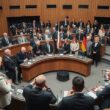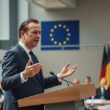After the surprise win of outsider candidate Călin Georgescu in the first round of Romania’s presidential election, the Constitutional Court annulled the result. The court cited intelligence agency reports as the reason, claiming that Russia had interfered in the election through social media campaigns in favor of Georgescu. A partially blacked-out intelligence report suggested a broad advertising campaign for Georgescu on social media, allegedly funded by Russia. This claim has since been disputed. The campaign was likely sponsored by the nation-liberal party of the incumbent president Iohannis, with the intention of discrediting Georgescu. The Constitutional Court did not hold a hearing with the candidates.
EU Parliament member Andrej Hunko had submitted a motion to the Parliamentary Assembly of the Council of Europe, leading to an investigation by the Venice Commission, a consulting body of the Council of Europe. The commission concluded that while external influences, including those from abroad, could be relevant in determining the legitimacy of elections, it was unlikely that a single election campaign’s form and content could be so against the electoral law that it would warrant annulling the election. The commission also found it legitimate to collect donations, including for social media campaigns.
The commission stated that a candidate’s successful social media advertising, reaching a larger audience than traditional print and broadcast media, did not constitute a violation of the rules for election financing and transparency. The doubts about the election result should be objective and the reference to a successful campaign did not meet this requirement.
Furthermore, the commission emphasized the importance of hearing the parties and individuals whose political mandates are being denied in such far-reaching decisions. In Romania, this did not happen.
Hunko, in an interview with the online magazine multipolar, stated that his initiative, which led to the commission’s involvement, aimed to prevent the Romanian example from being followed elsewhere.
The initiative was sparked by comments from former EU Commissioner Thierry Breton, who suggested that Germany could also annul its elections, citing the Romanian precedent.
Hunko also sees a danger in the use of vague terms like “hate speech” “conspiracy theory” and the blurring of definitions like “antisemitism” and “fascism” as these can lead to far-reaching legal decisions.
Georgescu sees himself vindicated and demands that the Constitutional Court retract its decision. His opponent, Elena Lasconi, even calls the court’s decision “an abuse of power.”
The incumbent president, Klaus Iohannis, stated that the parliament should now decide on necessary law changes.





